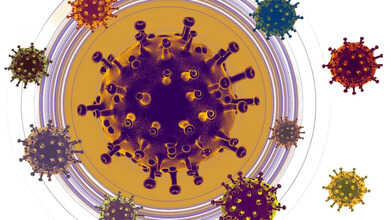- Health Conditions A-Z
- Health & Wellness
- Nutrition
- Fitness
- Health News
- Ayurveda
- Videos
- Medicine A-Z
- Parenting
- Web Stories
FDA Approves Blood Test for Alzheimer’s Diagnosis: All You Need To Know

Credits: Canva
The U.S. Food and Drug Administration (FDA) has cleared another blood test designed to help doctors evaluate Alzheimer’s disease and other causes of memory and cognitive decline. The approval marks an important step toward quicker and less invasive diagnosis of the condition.
Roche Diagnostics announced on Monday that the FDA has authorized its Alzheimer’s blood test, developed in partnership with Eli Lilly. The new test aims to assist doctors in the early assessment of patients who may be showing signs of dementia. This approval comes soon after the FDA gave the green light to Fujirebio Diagnostics’ Lumipulse test in May 2025, the first blood test ever approved to identify the degenerative brain condition.
As this new test gains attention, here’s a closer look at how it works, what sets it apart, and what other blood tests have been approved for Alzheimer’s diagnosis.
Lilly’s Test Approved for Alzheimer’s Diagnosis
Roche Diagnostics confirmed that the FDA has granted clearance for Elecsys, its blood test co-developed with Eli Lilly, as a tool to help assess Alzheimer’s disease. The test measures pTau181, a protein strongly linked to Alzheimer’s and brain degeneration. It is designed for people aged 55 and older who are showing signs or symptoms of cognitive decline.
This approval follows the earlier FDA authorization of ‘Fujirebio’s Lumipulse G pTau217/ß-Amyloid 1-42 Plasma Ratio’ test in May. Together, these tests represent major progress in early detection, which could make it easier for patients to begin treatment with drugs such as Biogen and Eisai’s Leqembi or Eli Lilly’s Kisunla. Traditional diagnostic options, such as spinal taps or PET brain scans, are either invasive or costly and not always covered by insurance.
As per CNN, Roche reported that in a clinical trial involving 312 people, Elecsys demonstrated a 97.9% success rate in ruling out Alzheimer’s. The company also highlighted that over 4,500 diagnostic machines are already operating in U.S. laboratories, making it easier to integrate this new test into existing systems.
What Is the Elecsys pTau181 Test?
The Elecsys pTau181 test is now the second blood-based biomarker test cleared by the FDA this year for Alzheimer’s diagnosis. Unlike the Lumipulse test, which measures a ratio of two proteins (pTau217 and beta-amyloid 1-42), Elecsys focuses on detecting the levels of a single protein—pTau181—in a person’s blood plasma. Elevated levels of this protein are often associated with Alzheimer’s and other neurodegenerative disorders.
Although several laboratory-developed and experimental tests are under study, blood-based testing remains an emerging yet promising tool in dementia research.
“The ability to diagnose Alzheimer’s earlier with a simple blood test—similar to how we test for cholesterol—is a real breakthrough,” said Dr. Howard Fillit, co-founder and chief science officer of the Alzheimer’s Drug Discovery Foundation. He explained that such advancements can help identify the disease sooner, giving patients better access to treatments that might slow or even prevent its progression.
With Roche’s Elecsys test now approved, experts like Dr. Richard Isaacson say the development is encouraging. Still, they advise cautious optimism as scientists continue refining blood-based diagnostics for Alzheimer’s.
‘Frankenstein’ COVID-19 Variant Hits Canada; Precautions You Should Take

Credits: Canva
There’s a new variant of COVID-19 spreading, nicknamed “Frankenstein,” and it has now been detected in Canada. The strain, officially known as XFG, is part of the Omicron family and earned its nickname because it combines genetic material from two Omicron subvariants.
‘Frankenstein’ COVID-19 Variant Hits Canada
“As of October 2025, XFG (sometimes referred to as the ‘stratus’ or ‘Frankenstein’ variant) is the most common COVID-19 variant in Canada, according to the weekly variant breakdown and the wastewater monitoring dashboard,” the Public Health Agency of Canada (PHAC) said in an email. The agency categorized XFG as a “variant under monitoring” and confirmed that Canadian scientists are closely watching its spread and potential impact.
Should You Be Worried About The Frankenstein Strain In Canada?
PHAC noted that while most COVID-19 indicators are rising nationally, trends differ by province and territory. “At this time, there is no evidence that the currently circulating COVID-19 variants in Canada are causing more severe illness,” the agency said. Interestingly, the Frankenstein variant has also appeared in countries such as the U.S., U.K., and France, and authorities there have indicated it is not particularly dangerous and can be managed with standard precautions.
What Is The Frankenstein Variant?
The World Health Organization (WHO) says that recent increases in COVID-19 cases are linked to a new variant called XFG, nicknamed “Frankenstein” because it is a recombinant virus, meaning it carries genetic material from two subtypes: LF.7 and LP.8.1.2. The WHO has been tracking XFG since June 25, 2025, and it has now been found in several countries. Current evidence suggests that the overall public health risk remains low, and existing COVID-19 vaccines are expected to continue preventing severe illness and symptomatic infection.
Precautions To Stay Safe From Frankenstein Variant
During the respiratory illness season, PHAC reminds everyone to stay current on recommended vaccines, including those for seasonal flu, COVID-19, and respiratory syncytial virus (RSV).
“These vaccines offer strong protection against serious illness. Check with your healthcare provider or local public health authority about which vaccines are right for you,” the agency advised.
Additionally, individuals can take personal measures to reduce the risk of catching or spreading respiratory illnesses.
PHAC explained that infectious diseases can spread through person-to-person contact or via contaminated surfaces, so using multiple precautions together is most effective.
Personal protective measures include:
- Staying home when feeling unwell
- Wearing a well-fitting mask or respirator when appropriate, including: if you are sick and need to be around others; during seasons when respiratory illnesses are more common, such as fall and winter; in closed or crowded spaces; and if you have personal risk factors (for example, higher risk for serious complications, or frequent contact with vulnerable people such as older adults, young children, pregnant individuals, or those with weakened immune systems)
- Improving ventilation indoors whenever possible
- Washing hands frequently
- Covering coughs and sneezes
- Cleaning and disinfecting high-touch surfaces and objects
NHS Launches New Test To Detect THIS Rare Genetic Condition in Newborns

Credits: Canva
Newborn babies in England will now be routinely screened for a rare genetic condition, NHS England has announced. This condition will be included in the standard blood test that babies receive on the fifth day after birth, collected from the heel. The screening will focus on Hereditary Tyrosinaemia Type 1 (HT1), a disorder that can lead to serious health issues if left untreated. Below, we explain what this condition is, its symptoms, potential severity, and more.
What Is Tyrosinaemia Type 1 (HT1)?
Hereditary tyrosinaemia type 1 (HT1) affects about one in every seven UK babies each year and can cause lasting health problems if not treated early. The condition stops the body from properly breaking down protein, causing toxic substances to build up in the blood. This important screening will now form part of the routine blood spot test, taken from a newborn’s heel on the fifth day after birth.
Tyrosinaemia Type 1 (HT1) is a rare, serious inherited disorder that affects metabolism. It prevents the body from processing the amino acid tyrosine due to a missing enzyme called fumarylacetoacetate hydrolase (FAH). Without this enzyme, harmful byproducts accumulate in the liver, kidneys, and nervous system, potentially causing severe liver and kidney disease, and increasing the risk of liver cancer if untreated.
Tyrosinaemia Type 1 (HT1) Early Signs
Early signs in babies can include poor growth, vomiting, diarrhoea, yellowing of the skin or eyes (jaundice), and an enlarged liver. If left untreated, later complications may involve weakened bones (rickets), neurological problems, and liver cancer.
In HT1, the missing enzyme fumarylacetoacetate hydrolase leads to a buildup of a harmful substance called succinylacetone (SUAC), which interferes with the body’s ability to process tyrosine.
Dr. Harrison Carter, NHS director of vaccination and screening, said: “Being able to screen for tyrosinaemia gives thousands of families extra reassurance. While most babies will not have a genetic condition, for those who do, early detection means treatment can start immediately, giving the baby a better chance at a healthy life.”
Once identified through the NHS screening, babies with HT1 can be treated with a medication called Nitisinone, which helps prevent high levels of tyrosine in the blood.
Tyrosinaemia Type 1 (HT1) Symptoms
According to the National Organization for Rare Disorders, HT1 symptoms in babies include poor growth, jaundice, enlarged liver and spleen, and a distinctive cabbage-like odor. In older children and adults, the condition can cause liver and kidney failure, bone weakening (rickets), bleeding problems, and neurological issues such as seizures or behavioral difficulties.
- Acute form (infancy)
- Difficulty gaining weight and growing (failure to thrive)
- Yellowing of the skin and eyes (jaundice)
- Enlarged liver and spleen
- Swollen abdomen
- Increased tendency to bleed (for example, nosebleeds)
- Vomiting and diarrhea
- Fever
- Chronic form (after 6 months to 2 years)
- Gradual development of liver and kidney problems
- Liver cirrhosis and nodules
- Softening of bones (rickets)
- Neurological complications
- Mild to moderate liver disease
- Later-stage and adult symptoms
- Severe liver and kidney damage or failure
- Higher risk of liver cancer
- Neurological issues such as intellectual disability, seizures, or psychiatric disorders
- Peripheral neuropathy
- Kidney dysfunction or failure
The HT1 test has been added to the NHS Newborn Blood Spot Screening Programme following a recommendation from the UK National Screening Committee.
After Coldrif, WHO Bans 2 More Drugs, But This Is Not the Only Death from Indian Cough Syrup

Credits: Canva
After Coldrif was linked to children's death in India, regulators have now advised against the use of two more cough syrups including Respifresh TR and ReLife. The World Health Organization (WHO) has also warned of the potential risks of the unregulated channels through which these cough syrups could be exported, however, as of now, these have not been exported.
Health alerts from Gujarat and other states describe both Respifresh and ReLife as containing DEG, “a toxic chemical that can cause serious poisoning, including kidney failure, neurological complications, and even death, particularly in children.”
Read: Cough Syrup Row: Death Toll Rise To 22 As 2 More Children Succumb
The Jammu And Kashmir Cough Syrup Death Case
However, this is not the first case of cough syrup linked deaths of children from India. Earlier, between 2019 and 2020, at least 12 children under five died in Jammu and Kashmir, allegedly from cough syrup. The syrup has been manufactured in Himachal Pradesh's Sirmaur district by pharmaceutical company Digital Vision. Scroll reported that Digital Vision has "not only gone to resume production, but found guilt of more drug quality violations."
The samples of the cough syrups were collected in Ramnagar and sent to lab for tests in Chandigarh. The tests found that "more 34% diethylene glycol", said Jammu and Kashmir drug controller Lotika Khajuria to BBC. The samples' findings were also corroborated by another Kolkata-based lab test, said Khajuria.
The BBC report mentioned that the toxins failed the children's kidneys, and in some cases, even multiple organs were affected, including brain, liver, and lungs. Some of the children were also to be put on ventilators, while some were left with major disabilities.
Also Read: What Does Trump's Latest Health Checkup Reveal About Him?
The Gambia Cough Syrup Death Case
In the September of 2022, reports BBC, a father in The Gambia, watched his young son slowly die in front of his eye. His son, 3-year-pld Lamin was among the 70 children, younger than five, who died in The Gambia of acute kidney injuries between July and October of 2022.
All these kids consumed one of the four cough syrups made by an Indian company called Maiden Pharmaceuticals. In fact, in October 2022, the WHO linked the deaths to the syrups and said that it found "unacceptable" levels of toxins in the medicines. A Gambian parliamentary panel also concluded after investigations that the deaths were the result of children ingesting the syrups.
However, the pharmaceutical company denied this and said that the cough syrups complied with quality standards when tested domestically. Though the then chairperson of the Gambian panel that investigated these deaths Amadou Camara strongly denied. He said, "We have evidence. We tested these drugs. [They] contained unacceptable amounts of ethylene glycol and diethylene glycol, and these were directly imported from India, manufactured by Maiden."
Ethylene glycol and diethylene glycol are toxic to humans and could be fatal if consumed.
Uzbekistan Cough Syrup Death Case
After the trial of August 2023, an Uzbekistan court sentenced 23 people to prison over the deaths of 68 children linked to contaminated cough syrup. Among them were Singh Ragvendra Pratar, reports BBC, who was given the longest sentence of 20 years. He was the executive director at Quaramax Medical, who distributed the contaminated cough syrups manufactured by Marion Biotech in India.
WHO in January 2023, also said that the products manufactured by Marion Biotech were "substandard" and that the firm had failed to provide guarantees about their safety. After this, India's health ministry suspended production at the company. The authorities stated that they were "permanently" cancelling the company's license.
© 2024 Bennett, Coleman & Company Limited

